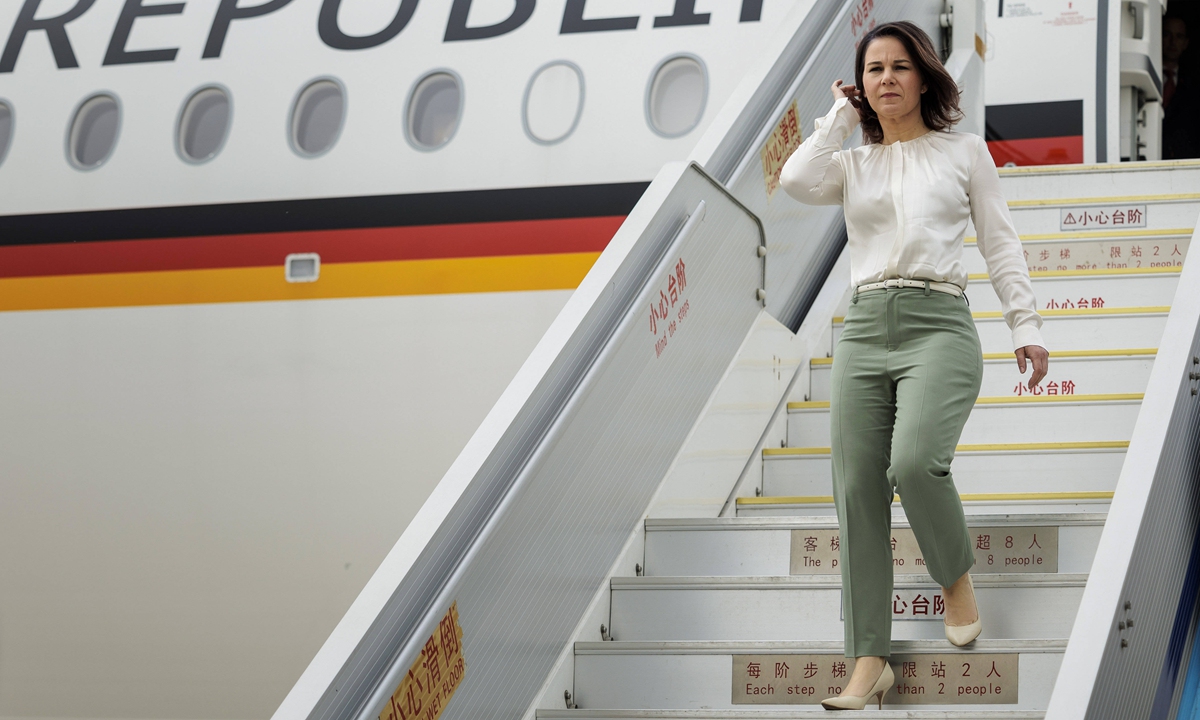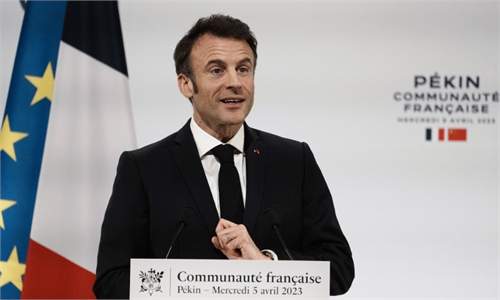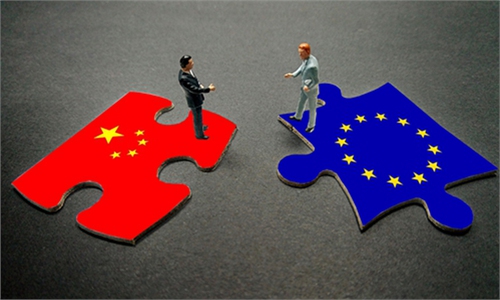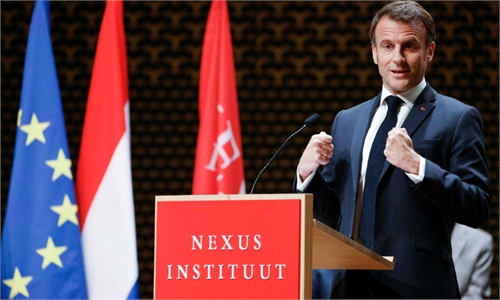German FM visits China amid EU's strategic autonomy debate
Macron’s words wake-up call as US only prioritizes own interests: expert

German Foreign Minister Annalena Baerbock arrives in North China's Tianjin on April 13, 2023 to start her three-day China visit. Photo: VCG
Germany's Foreign Minister Annalena Baerbock began her three-day visit in North China's Tianjin on Thursday, as Europe is having a major debate in recent days on how to deal with China, after French President Emmanuel Macron's call for Europe to reduce its reliance on the US drew ire from the US while winning support inside Europe.
The German foreign minister's visit, which comes amid intensive China-EU interactions, signaled a major recalibration of China-EU high-level exchanges, and could pave the way for further resumption of cooperation in politics, economy as well as people-to-people fields, some experts said.
Given that Baerbock has long advocated a tough approach toward China, Chinese experts believe that it's unrealistic to expect the German official to have the same positive attitude toward China as Macron holds, but "it's important to have in-depth and face-to-face communication to help dispel some misunderstandings and find common ground, especially when China-Germany cooperation has a solid foundation in the business and trade fields."
'Objective, comprehensive view'
Just hours ahead of Baerbock's visit to China, German Foreign Ministry on Wednesday claimed China "had inflamed tensions with its military exercise around Taiwan island" and the German government appealed for efforts to reduce tensions across the Taiwan Straits, according to media reports.
In a statement released ahead of the trip, Baerbock described China as a "competitor", "systemic rival" and "global player that increasingly wants to shape the world order according to its own designs."
Baerbock said Germany had no interest in economic decoupling from China, but would aim to "de-risk" by reducing its economic dependency, media reported.
But Sun Keqin, a research fellow at the China Institutes of Contemporary International Relations, told the Global Times on Thursday that "despite Baerbock's tough stance on China, Germany's China policy has its own consistency and she cannot go against the roadmap set by Chancellor Olaf Scholz's visit in November 2022."
Germany's pragmatic approach toward China remains a consensus of the government, Sun said.
"As it's her first visit to China as foreign minister, the visit is expected to help shape a more objective and comprehensive view of China and China-Germany relations, but it's unrealistic to expect really positive expressions," Cui Hongjian, director of the Department of European Studies at the China Institute of International Studies, told the Global Times on Thursday.
A series of dialogue mechanisms between the two countries, ranging from strategic level to finance and culture, will be resumed, Cui said, believing Baerbock's visit serves as a first step to more dialogues that will help stabilize China-Germany ties," Cui said.
As the US tries to isolate China and push forward the decoupling rhetoric among its allies, German companies are moving closer to China, the New York Times said on Wednesday. For instance, two powerful engines of the German economy, Volkswagen and the chemical company BASF, are broadening their huge Chinese investments.
German media Deutsche Welle reported that Baerbock was set to visit a school in Tianjin that teaches German on Thursday as well as a wind turbine factory owned by a German company.
"The cooperation between the two countries has been growing rapidly since the Merkel era. Although Baerbock called for a reduction of reliance on China, German companies have made their own choices by considering their interests. And it's good for her to listen to the voices of German business circles in China first," Sun said.
As the largest economy in Europe, Germany should continue to maintain and advance business and trade ties with China. "Only when Germany ensures its status inside Europe can it play a more significant role in the bloc," Cui said.
Allies who disagree
Baerbock's trip came as more European officials reacted to Macron's remarks.
Macron defended his approach to the US and China on Wednesday, saying that "being an ally doesn't mean being a vassal." He earlier told media that Europe should avoid being ensnared in conflicts that were not its affair, and should not act as "followers" of the US when it comes to the Taiwan question.
German Defense Minister Boris Pistorius on Thursday said Macron's comments were "unfortunate," AFP reported.
Commenting on Macron's remarks on Europe's strategic autonomy and the Taiwan question, the French Ambassador to China, Bertrand Lortholary, told the Global Times on Thursday that it's good to have debates and listen to different voices, and expressing different opinions is something that is cherished in France.
"France is a close ally of the US with a long history and we are also allies in NATO. But it doesn't mean that we always share the same views. We can be allies but with differences," Lortholary told the Global Times, who referred to France's support for the US over the 9/11 terrorist attack and refusal to join the Iraq War.
France also became the first Western country to recognize the PRC in 1964, which was an independent decision made on its own and one we have never regretted, the French envoy said.
On Macron's remarks on Taiwan, "it's commonly known that France recognizes the one-China policy, which has never changed. Our fundamental goal is to maintain stability and peace, not only in the Taiwan Straits but also in other places around the world," Lortholary said.
Under Washington's alliance strategy, pro-US forces in Europe have been moving even closer to the US. Against the backdrop of the Ukraine crisis, criticizing Russia has become politically correct in Europe, and its byproduct is slandering China, Sun Keqin said.
"As Europe is losing its strategic autonomy due to its heavy dependence on the US, Macron's words serve as wake-up call, as US hegemony won't take the interests of Europe into account, but only prioritize its own interests," he said.




